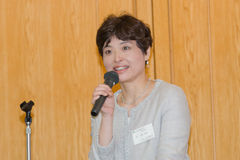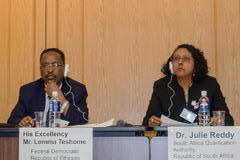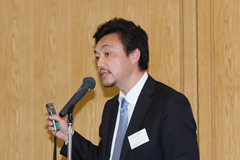Discussing the Development of Human Resources for Industries in Africa: TICAD VI Follow-up Symposium
2017.03.27
The development of human resources to meet the industrial needs is a key to industrial growth, leading to an expansion in employment and a reduction in poverty in Africa. The 6th Tokyo International Conference on African Development (TICAD VI), held in August 2016 in Nairobi, Kenya, also highlighted the importance of developing industrial skills. On February 23, 2017, JICA and Nagoya University co-hosted the TICAD VI Follow-up symposium, entitled "Industrial Skills Development for Sustainable Growth in Africa" at the JICA Ichigaya Building. Participants from various African nations and researchers discussed the current situation and the challenges of industrial skills development in Africa, as well as sharing future perspectives.
In her keynote speech, Professor Shoko Yamada of Nagoya University pointed out that, despite the expansion of employment resulting from economic growth in Africa, there were issues such as low labor productivity and a high unemployment rate, especially among young people. Yamada explained the need to acquire skills to meet changing industry demands. Yamada further observed that "in recent years, a strong African economy has propelled Japanese companies to show more interest in investing in Africa. However, compared to Asia, there is a significant lack of information and experience regarding businesses in Africa. A mechanism to develop local human resources with technical skills and leadership skills is needed. It is an urgent requirement to develop human resources for the growth of society, overall."

Shoko Yamada, professor, Nagoya University
Hiroyuki Tomita, director of the Team II Private Sector Development Group, Industrial Development and Public Policy Department, JICA, gave a presentation on Japanese cooperation on industrial skills development in Africa. Tomita highlighted JICA's seamless support from basic education to higher education, and introduced successful examples of promoting human resource development, such as quality and productivity improvement (kaizen) in Ethiopia. This method is spreading throughout Africa, thereby contributing to achieving the Sustainable Development Goals (SDGs).
Lemma Teshome, state minister, Ministry of Education, Federal Democratic Republic of Ethiopia, gave a presentation on governmental initiatives for industrial development and labor market conditions in Ethiopia. Teshome explained that Ethiopia has put effort into the development of its sewing and leather industries, and has been working on system reforms for prioritizing technical and vocational education and training (TVET) to develop human resources having the skills to meet the needs of related companies.
Julie Reddy, deputy chief executive Officer, South Africa Qualification Authority, Republic of South Africa, described South Africa’s current circumstances of a mismatch between education and employment, such as a qualified engineer taking a job in the financial industry. Reddy explained that the government would strive to measure peoples’ skills accurately by spreading a national accreditation system throughout the country and improving the quality of industrial human resources.

Lemma Teshome, state minister, Ministry of Education, Federal Democratic Republic of Ethiopia (Left) and Julie Reddy, deputy chief executive Officer, South Africa Qualification Authority, Republic of South Africa
By introducing the views of Japanese companies doing business in Africa, Keiichi Shirato, chief analyst, Middle East & Africa Department, Mitsui Global Strategic Studies Institute, proposed that "unlike how the growth of domestic companies led to Japan’s economic development, foreign companies are the key to encouraging economic growth in Africa. The idea of industrial human resources may differ between Japan and Africa. We need to recognize the perspective of developing industrial human resources in Africa as to meet the needs of foreign companies."
In the panel discussion, participants actively discussed about what kind of skills are needed for industrial human resources to contribute to economic development, as well as about what kind of efforts were needed to rectify the mismatch between employers and the employed. Questions were raised by the floor such as "Even though more people are educated, there is an insufficient number of companies to hire them. What kind of industries need to be cultivated?" and "In what ways can Japan apply its experiences with development in Asia to Africa?".

Keiichi Shirato, chief analyst, Middle East & Africa Department, Mitsui Global Strategic Studies Institute

事業事前評価表(地球規模課題対応国際科学技術協力(SATREPS)).国際協力機構 地球環境部 . 防災第一チーム. 1.案件名.国 名: フィリピン共和国.

事業事前評価表(地球規模課題対応国際科学技術協力(SATREPS)).国際協力機構 地球環境部 . 防災第一チーム. 1.案件名.国 名: フィリピン共和国.

事業事前評価表(地球規模課題対応国際科学技術協力(SATREPS)).国際協力機構 地球環境部 . 防災第一チーム. 1.案件名.国 名: フィリピン共和国.

事業事前評価表(地球規模課題対応国際科学技術協力(SATREPS)).国際協力機構 地球環境部 . 防災第一チーム. 1.案件名.国 名: フィリピン共和国.

事業事前評価表(地球規模課題対応国際科学技術協力(SATREPS)).国際協力機構 地球環境部 . 防災第一チーム. 1.案件名.国 名: フィリピン共和国.
scroll